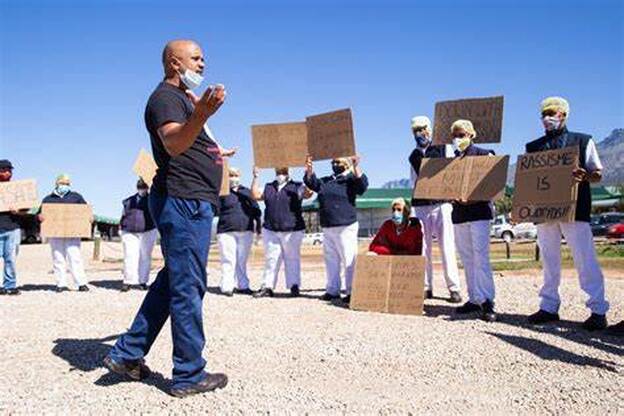|
Navigating washed-out roads and piles of debris, Mayra Rivera quickly began checking on coworkers and neighbors after Hurricane Fiona battered Puerto Rico in September. Rivera, president of United Steelworkers (USW) Local 8198, realized she’d spend months if not years helping the island navigate a daunting cleanup and recovery process. But her immediate goal was ensuring community members had the basics: Safe food. Clean drinking water. And, just as important, a shoulder for survivors to lean on as they began picking up the pieces of their shattered lives. While labor unions continue their traditional fights for decent wages, affordable health care, and safe working conditions, they’re also stepping up to help workers manage stress and the threats to mental health that they encounter on and off the job. Rivera, whose local represents municipal workers in the southern coastal city of Ponce, collaborated with the USW’s Tony Mazzocchi Center for Health, Safety and Environmental Education in recent years to deliver disaster and mental resilience training to island communities pummeled by a string of hurricanes and earthquakes. The training includes techniques for helping families prepare physically and psychologically for disasters, such as assembling “go bags” to sustain them in case of extended evacuations. The program, adapted from resources and materials developed by the National Institute of Environmental Health Sciences Worker Training Program, also helps to boost residents’ safety and confidence by demonstrating how to guard against contaminants, downed power lines, and other hazards that hurricanes leave in their wake. And the training showcases strategies—like providing social support, as Rivera offered in Fiona’s aftermath—to help survivors maintain the resilience essential to persevering after tragedy strikes. Rivera knows that the same solidarity that lifts up workers on the job also can help disaster survivors get through their darkest days. “They start talking and talking and talking. They need to talk. People need to be heard,” said Rivera, recalling how eagerly residents related their experiences to her after Fiona knocked out power to the entire island, destroyed infrastructure, and flattened entire communities. Providing this kind of outlet is especially critical, she noted, to maintain hope among people who were still trying to bounce back from five-year-old Hurricane Maria when Fiona walloped them again. Tarps still covered thousands of homes that lost their roofs during Maria. Fiona destroyed some of the same infrastructure all over again. The wave of disasters created a looming mental health crisis that Rivera says her union is well suited to help address. “We are a family,” said Rivera, who lost her own farm during Maria and can relate on a personal level with coworkers, neighbors, and others impacted by disaster. “It’s easier for them to open up to us.” Studies document the therapeutic power of social connections. Researchers from Rowan University in Glassboro, New Jersey, tracked about 2,200 Hurricane Sandy survivors between the ages of 54 and 80 over a period of years. They found lower rates of post-traumatic stress disorder (PTSD) symptoms among those who experienced higher levels of social cohesion after the storm, which struck Puerto Rico and parts of the United States, along with several other countries, in 2012. Similarly, a Harvard study found that strong social connections mattered more than material resources, such as food and shelter, in helping elderly survivors cope with the 2011 earthquake and tsunami in Japan. Social interaction even helped to stave off the cognitive decline many survivors experienced after the tragedy. Disasters exacerbate threats to mental health and give unions special opportunities to help workers and communities endure. But unions also help members combat corrosive, everyday stressors that chip away at their families’ well-being. Unions bargain strong contracts, for example, with paid sick days, bereavement leave, assistance programs, and other resources to help workers juggle job and family pressures—then zealously enforce those contracts to ensure members actually derive the intended benefits. USW Local 8599’s contract with the Fontana (California) Unified School District provides leave that workers may use to spend time with dying relatives. When a supervisor tried to block one worker from using the leave, Local President Dawn Dooley immediately intervened with school officials, securing the union member both the time off and peace of mind. Dooley continually reminds members that they’re never up against management alone. “You have the right to representation,” she says, “even if the conflict occurs at a potluck dinner.” As more and more Americans report problems with stress, unions seek new ways to leverage the power of solidarity and equip workers in the fight for mental health. When the communications company TELUS began harassing workers for taking restroom breaks, USW Local 1944 used the grievance process to safeguard members’ rights and safety. But the local, which represents thousands of workers at company call centers across Canada, also launched a broader campaign to protect members from the burnout they risked because of their stressful jobs. Among other steps, the local’s Women of Steel committee published a series of user-friendly guides on how to address fatigue, anxiety, and depression. The guides explain that burnout is “the consequence of a high-performance culture,” not a personal failure, and emphasize the importance of sharing frustrations with coworkers and union leaders. “We lift them up and give them a safe space so they can have a conversation,” Local President Donna Hokiro explained. “People feel empowered.” “We fight for you,” she added of the union, “but we also teach you how to fight for yourself.” AuthorTom Conway is the international president of the United Steelworkers Union (USW). This article was produced by the Independent Media Institute. Archives November 2022
0 Comments
Leave a Reply. |
Details
Archives
July 2024
Categories
All
|

 RSS Feed
RSS Feed